SEO Expert Suggestions for Desklib Online Library
VerifiedAdded on 2023/06/07
|10
|3410
|141
AI Summary
This article discusses the legal elements required for a valid contract and their application in two scenarios. It also explains the concept of consideration and its importance in contract law. The output provides SEO expert suggestions for Desklib, an online library for study material with solved assignments, essays, dissertations, etc.
Contribute Materials
Your contribution can guide someone’s learning journey. Share your
documents today.
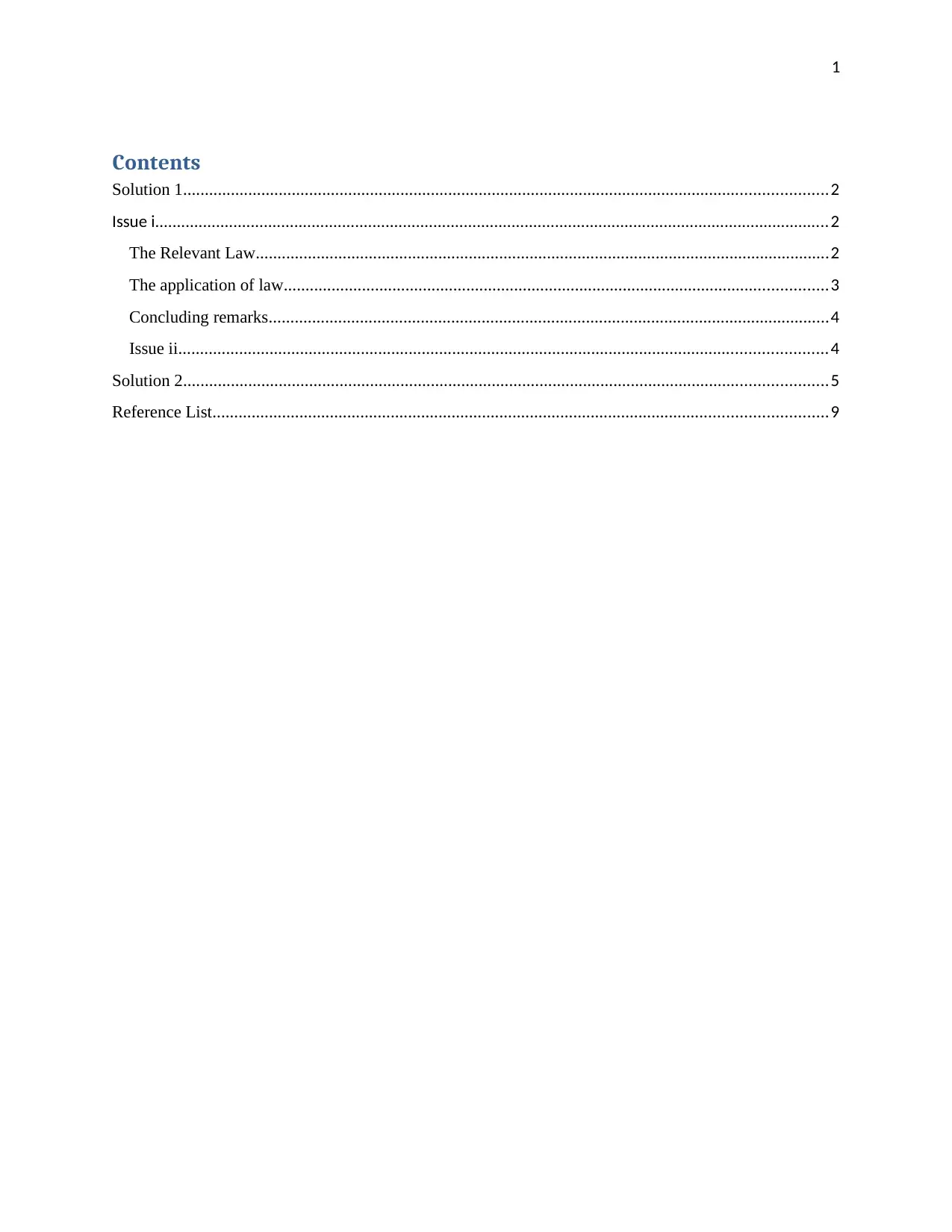
1
Contents
Solution 1....................................................................................................................................................2
Issue i...........................................................................................................................................................2
The Relevant Law....................................................................................................................................2
The application of law.............................................................................................................................3
Concluding remarks.................................................................................................................................4
Issue ii.....................................................................................................................................................4
Solution 2....................................................................................................................................................5
Reference List.............................................................................................................................................9
Contents
Solution 1....................................................................................................................................................2
Issue i...........................................................................................................................................................2
The Relevant Law....................................................................................................................................2
The application of law.............................................................................................................................3
Concluding remarks.................................................................................................................................4
Issue ii.....................................................................................................................................................4
Solution 2....................................................................................................................................................5
Reference List.............................................................................................................................................9
Secure Best Marks with AI Grader
Need help grading? Try our AI Grader for instant feedback on your assignments.
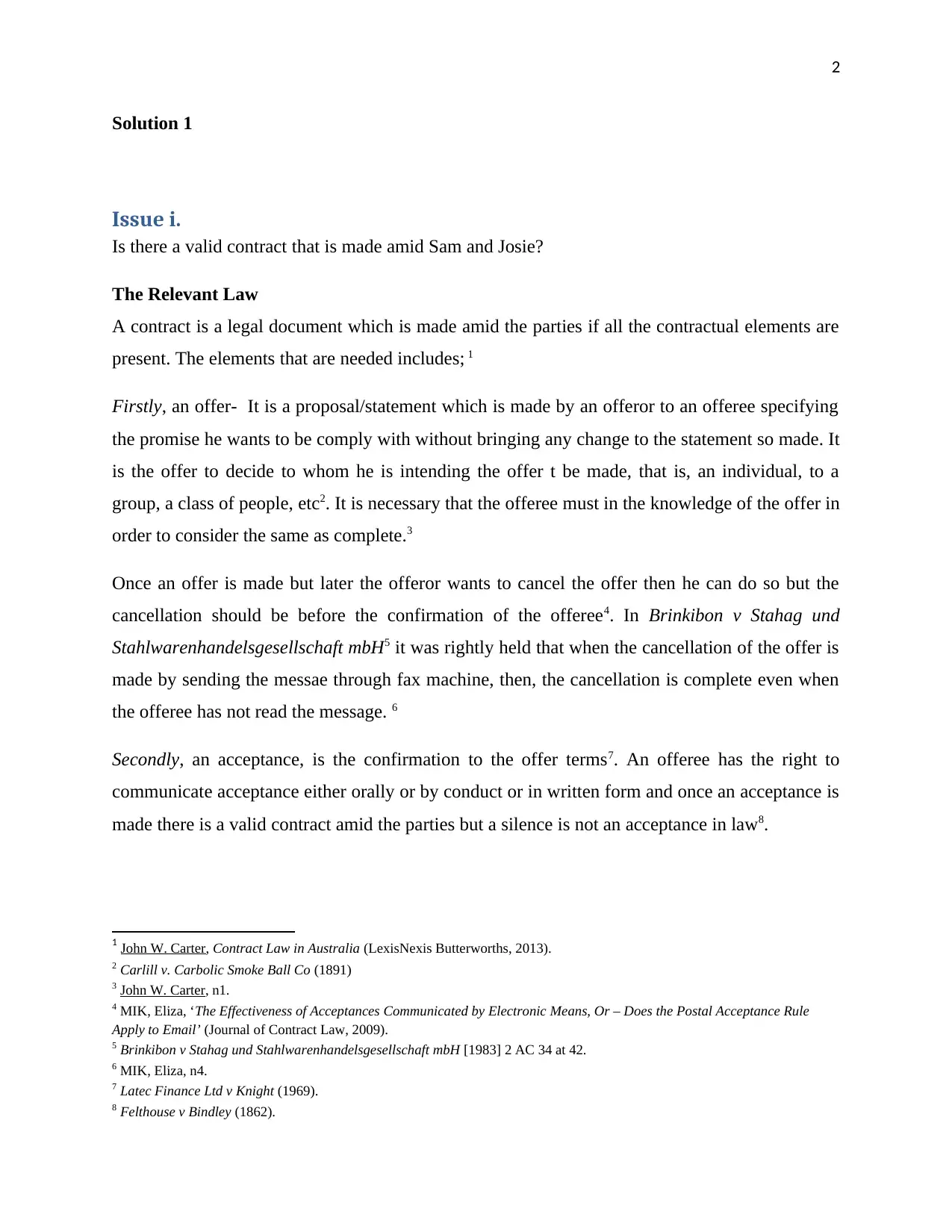
2
Solution 1
Issue i.
Is there a valid contract that is made amid Sam and Josie?
The Relevant Law
A contract is a legal document which is made amid the parties if all the contractual elements are
present. The elements that are needed includes; 1
Firstly, an offer- It is a proposal/statement which is made by an offeror to an offeree specifying
the promise he wants to be comply with without bringing any change to the statement so made. It
is the offer to decide to whom he is intending the offer t be made, that is, an individual, to a
group, a class of people, etc2. It is necessary that the offeree must in the knowledge of the offer in
order to consider the same as complete.3
Once an offer is made but later the offeror wants to cancel the offer then he can do so but the
cancellation should be before the confirmation of the offeree4. In Brinkibon v Stahag und
Stahlwarenhandelsgesellschaft mbH5 it was rightly held that when the cancellation of the offer is
made by sending the messae through fax machine, then, the cancellation is complete even when
the offeree has not read the message. 6
Secondly, an acceptance, is the confirmation to the offer terms7. An offeree has the right to
communicate acceptance either orally or by conduct or in written form and once an acceptance is
made there is a valid contract amid the parties but a silence is not an acceptance in law8.
1 John W. Carter, Contract Law in Australia (LexisNexis Butterworths, 2013).
2 Carlill v. Carbolic Smoke Ball Co (1891)
3 John W. Carter, n1.
4 MIK, Eliza, ‘The Effectiveness of Acceptances Communicated by Electronic Means, Or – Does the Postal Acceptance Rule
Apply to Email’ (Journal of Contract Law, 2009).
5 Brinkibon v Stahag und Stahlwarenhandelsgesellschaft mbH [1983] 2 AC 34 at 42.
6 MIK, Eliza, n4.
7 Latec Finance Ltd v Knight (1969).
8 Felthouse v Bindley (1862).
Solution 1
Issue i.
Is there a valid contract that is made amid Sam and Josie?
The Relevant Law
A contract is a legal document which is made amid the parties if all the contractual elements are
present. The elements that are needed includes; 1
Firstly, an offer- It is a proposal/statement which is made by an offeror to an offeree specifying
the promise he wants to be comply with without bringing any change to the statement so made. It
is the offer to decide to whom he is intending the offer t be made, that is, an individual, to a
group, a class of people, etc2. It is necessary that the offeree must in the knowledge of the offer in
order to consider the same as complete.3
Once an offer is made but later the offeror wants to cancel the offer then he can do so but the
cancellation should be before the confirmation of the offeree4. In Brinkibon v Stahag und
Stahlwarenhandelsgesellschaft mbH5 it was rightly held that when the cancellation of the offer is
made by sending the messae through fax machine, then, the cancellation is complete even when
the offeree has not read the message. 6
Secondly, an acceptance, is the confirmation to the offer terms7. An offeree has the right to
communicate acceptance either orally or by conduct or in written form and once an acceptance is
made there is a valid contract amid the parties but a silence is not an acceptance in law8.
1 John W. Carter, Contract Law in Australia (LexisNexis Butterworths, 2013).
2 Carlill v. Carbolic Smoke Ball Co (1891)
3 John W. Carter, n1.
4 MIK, Eliza, ‘The Effectiveness of Acceptances Communicated by Electronic Means, Or – Does the Postal Acceptance Rule
Apply to Email’ (Journal of Contract Law, 2009).
5 Brinkibon v Stahag und Stahlwarenhandelsgesellschaft mbH [1983] 2 AC 34 at 42.
6 MIK, Eliza, n4.
7 Latec Finance Ltd v Knight (1969).
8 Felthouse v Bindley (1862).
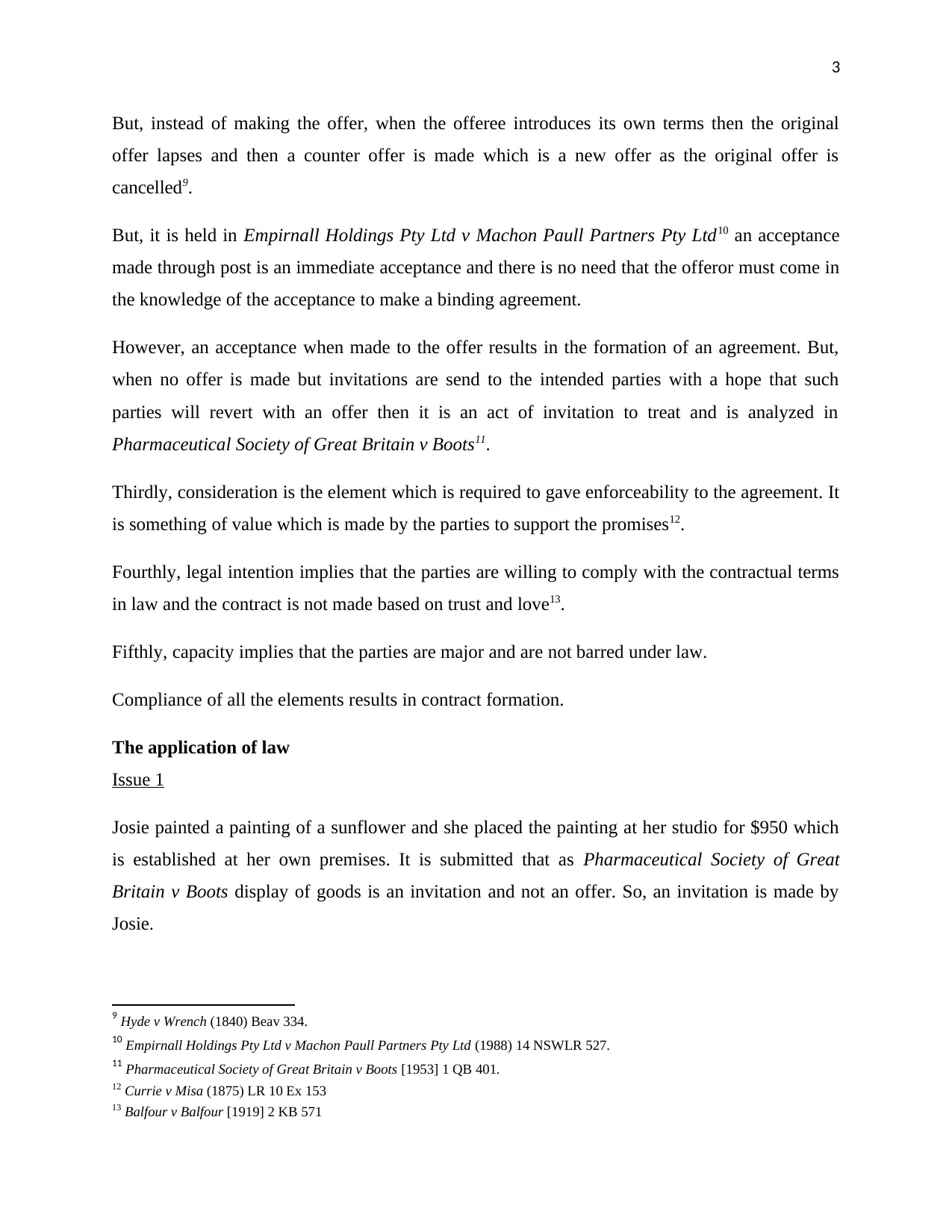
3
But, instead of making the offer, when the offeree introduces its own terms then the original
offer lapses and then a counter offer is made which is a new offer as the original offer is
cancelled9.
But, it is held in Empirnall Holdings Pty Ltd v Machon Paull Partners Pty Ltd10 an acceptance
made through post is an immediate acceptance and there is no need that the offeror must come in
the knowledge of the acceptance to make a binding agreement.
However, an acceptance when made to the offer results in the formation of an agreement. But,
when no offer is made but invitations are send to the intended parties with a hope that such
parties will revert with an offer then it is an act of invitation to treat and is analyzed in
Pharmaceutical Society of Great Britain v Boots11.
Thirdly, consideration is the element which is required to gave enforceability to the agreement. It
is something of value which is made by the parties to support the promises12.
Fourthly, legal intention implies that the parties are willing to comply with the contractual terms
in law and the contract is not made based on trust and love13.
Fifthly, capacity implies that the parties are major and are not barred under law.
Compliance of all the elements results in contract formation.
The application of law
Issue 1
Josie painted a painting of a sunflower and she placed the painting at her studio for $950 which
is established at her own premises. It is submitted that as Pharmaceutical Society of Great
Britain v Boots display of goods is an invitation and not an offer. So, an invitation is made by
Josie.
9 Hyde v Wrench (1840) Beav 334.
10 Empirnall Holdings Pty Ltd v Machon Paull Partners Pty Ltd (1988) 14 NSWLR 527.
11 Pharmaceutical Society of Great Britain v Boots [1953] 1 QB 401.
12 Currie v Misa (1875) LR 10 Ex 153
13 Balfour v Balfour [1919] 2 KB 571
But, instead of making the offer, when the offeree introduces its own terms then the original
offer lapses and then a counter offer is made which is a new offer as the original offer is
cancelled9.
But, it is held in Empirnall Holdings Pty Ltd v Machon Paull Partners Pty Ltd10 an acceptance
made through post is an immediate acceptance and there is no need that the offeror must come in
the knowledge of the acceptance to make a binding agreement.
However, an acceptance when made to the offer results in the formation of an agreement. But,
when no offer is made but invitations are send to the intended parties with a hope that such
parties will revert with an offer then it is an act of invitation to treat and is analyzed in
Pharmaceutical Society of Great Britain v Boots11.
Thirdly, consideration is the element which is required to gave enforceability to the agreement. It
is something of value which is made by the parties to support the promises12.
Fourthly, legal intention implies that the parties are willing to comply with the contractual terms
in law and the contract is not made based on trust and love13.
Fifthly, capacity implies that the parties are major and are not barred under law.
Compliance of all the elements results in contract formation.
The application of law
Issue 1
Josie painted a painting of a sunflower and she placed the painting at her studio for $950 which
is established at her own premises. It is submitted that as Pharmaceutical Society of Great
Britain v Boots display of goods is an invitation and not an offer. So, an invitation is made by
Josie.
9 Hyde v Wrench (1840) Beav 334.
10 Empirnall Holdings Pty Ltd v Machon Paull Partners Pty Ltd (1988) 14 NSWLR 527.
11 Pharmaceutical Society of Great Britain v Boots [1953] 1 QB 401.
12 Currie v Misa (1875) LR 10 Ex 153
13 Balfour v Balfour [1919] 2 KB 571
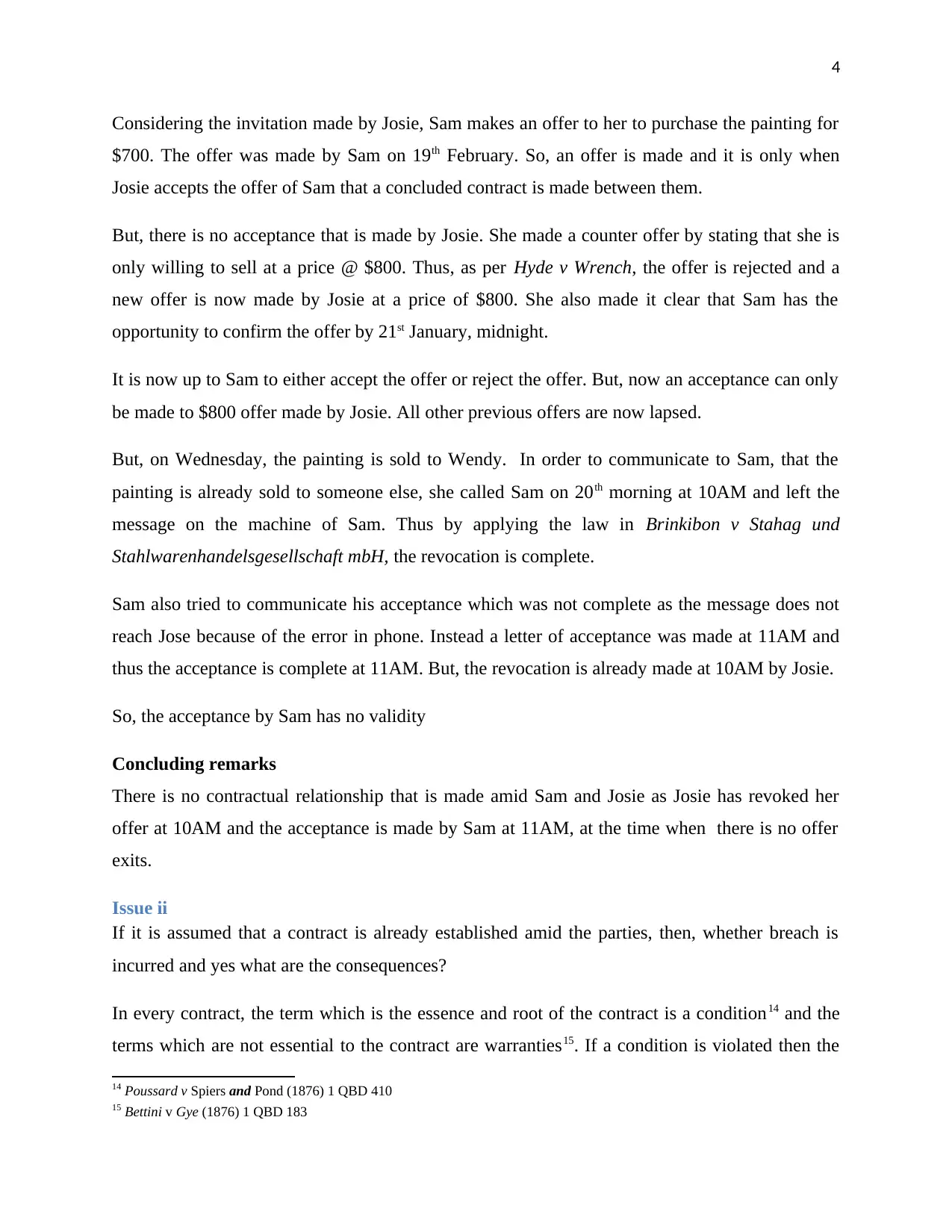
4
Considering the invitation made by Josie, Sam makes an offer to her to purchase the painting for
$700. The offer was made by Sam on 19th February. So, an offer is made and it is only when
Josie accepts the offer of Sam that a concluded contract is made between them.
But, there is no acceptance that is made by Josie. She made a counter offer by stating that she is
only willing to sell at a price @ $800. Thus, as per Hyde v Wrench, the offer is rejected and a
new offer is now made by Josie at a price of $800. She also made it clear that Sam has the
opportunity to confirm the offer by 21st January, midnight.
It is now up to Sam to either accept the offer or reject the offer. But, now an acceptance can only
be made to $800 offer made by Josie. All other previous offers are now lapsed.
But, on Wednesday, the painting is sold to Wendy. In order to communicate to Sam, that the
painting is already sold to someone else, she called Sam on 20th morning at 10AM and left the
message on the machine of Sam. Thus by applying the law in Brinkibon v Stahag und
Stahlwarenhandelsgesellschaft mbH, the revocation is complete.
Sam also tried to communicate his acceptance which was not complete as the message does not
reach Jose because of the error in phone. Instead a letter of acceptance was made at 11AM and
thus the acceptance is complete at 11AM. But, the revocation is already made at 10AM by Josie.
So, the acceptance by Sam has no validity
Concluding remarks
There is no contractual relationship that is made amid Sam and Josie as Josie has revoked her
offer at 10AM and the acceptance is made by Sam at 11AM, at the time when there is no offer
exits.
Issue ii
If it is assumed that a contract is already established amid the parties, then, whether breach is
incurred and yes what are the consequences?
In every contract, the term which is the essence and root of the contract is a condition14 and the
terms which are not essential to the contract are warranties15. If a condition is violated then the
14 Poussard v Spiers and Pond (1876) 1 QBD 410
15 Bettini v Gye (1876) 1 QBD 183
Considering the invitation made by Josie, Sam makes an offer to her to purchase the painting for
$700. The offer was made by Sam on 19th February. So, an offer is made and it is only when
Josie accepts the offer of Sam that a concluded contract is made between them.
But, there is no acceptance that is made by Josie. She made a counter offer by stating that she is
only willing to sell at a price @ $800. Thus, as per Hyde v Wrench, the offer is rejected and a
new offer is now made by Josie at a price of $800. She also made it clear that Sam has the
opportunity to confirm the offer by 21st January, midnight.
It is now up to Sam to either accept the offer or reject the offer. But, now an acceptance can only
be made to $800 offer made by Josie. All other previous offers are now lapsed.
But, on Wednesday, the painting is sold to Wendy. In order to communicate to Sam, that the
painting is already sold to someone else, she called Sam on 20th morning at 10AM and left the
message on the machine of Sam. Thus by applying the law in Brinkibon v Stahag und
Stahlwarenhandelsgesellschaft mbH, the revocation is complete.
Sam also tried to communicate his acceptance which was not complete as the message does not
reach Jose because of the error in phone. Instead a letter of acceptance was made at 11AM and
thus the acceptance is complete at 11AM. But, the revocation is already made at 10AM by Josie.
So, the acceptance by Sam has no validity
Concluding remarks
There is no contractual relationship that is made amid Sam and Josie as Josie has revoked her
offer at 10AM and the acceptance is made by Sam at 11AM, at the time when there is no offer
exits.
Issue ii
If it is assumed that a contract is already established amid the parties, then, whether breach is
incurred and yes what are the consequences?
In every contract, the term which is the essence and root of the contract is a condition14 and the
terms which are not essential to the contract are warranties15. If a condition is violated then the
14 Poussard v Spiers and Pond (1876) 1 QBD 410
15 Bettini v Gye (1876) 1 QBD 183
Secure Best Marks with AI Grader
Need help grading? Try our AI Grader for instant feedback on your assignments.
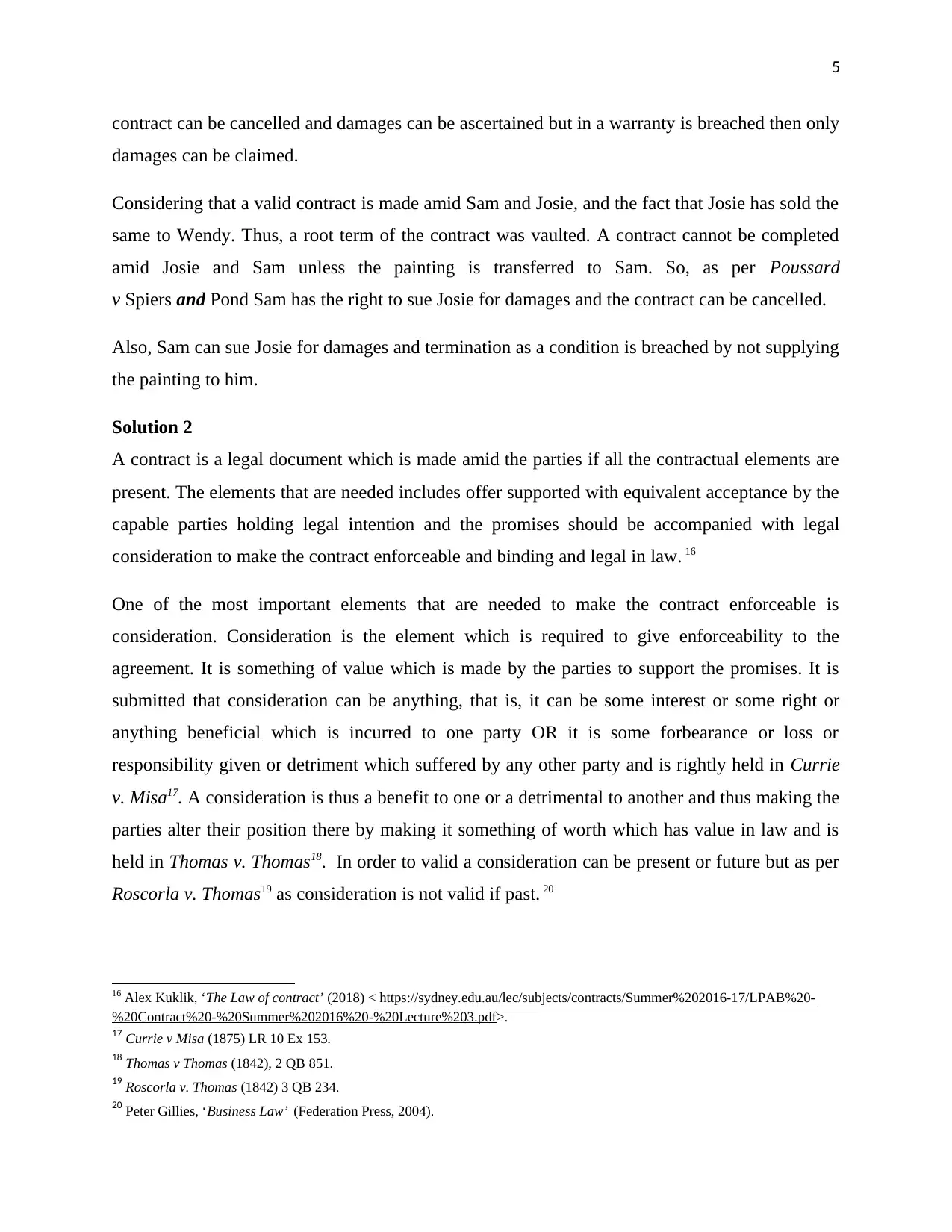
5
contract can be cancelled and damages can be ascertained but in a warranty is breached then only
damages can be claimed.
Considering that a valid contract is made amid Sam and Josie, and the fact that Josie has sold the
same to Wendy. Thus, a root term of the contract was vaulted. A contract cannot be completed
amid Josie and Sam unless the painting is transferred to Sam. So, as per Poussard
v Spiers and Pond Sam has the right to sue Josie for damages and the contract can be cancelled.
Also, Sam can sue Josie for damages and termination as a condition is breached by not supplying
the painting to him.
Solution 2
A contract is a legal document which is made amid the parties if all the contractual elements are
present. The elements that are needed includes offer supported with equivalent acceptance by the
capable parties holding legal intention and the promises should be accompanied with legal
consideration to make the contract enforceable and binding and legal in law. 16
One of the most important elements that are needed to make the contract enforceable is
consideration. Consideration is the element which is required to give enforceability to the
agreement. It is something of value which is made by the parties to support the promises. It is
submitted that consideration can be anything, that is, it can be some interest or some right or
anything beneficial which is incurred to one party OR it is some forbearance or loss or
responsibility given or detriment which suffered by any other party and is rightly held in Currie
v. Misa17. A consideration is thus a benefit to one or a detrimental to another and thus making the
parties alter their position there by making it something of worth which has value in law and is
held in Thomas v. Thomas18. In order to valid a consideration can be present or future but as per
Roscorla v. Thomas19 as consideration is not valid if past. 20
16 Alex Kuklik, ‘The Law of contract’ (2018) < https://sydney.edu.au/lec/subjects/contracts/Summer%202016-17/LPAB%20-
%20Contract%20-%20Summer%202016%20-%20Lecture%203.pdf>.
17 Currie v Misa (1875) LR 10 Ex 153.
18 Thomas v Thomas (1842), 2 QB 851.
19 Roscorla v. Thomas (1842) 3 QB 234.
20 Peter Gillies, ‘Business Law’ (Federation Press, 2004).
contract can be cancelled and damages can be ascertained but in a warranty is breached then only
damages can be claimed.
Considering that a valid contract is made amid Sam and Josie, and the fact that Josie has sold the
same to Wendy. Thus, a root term of the contract was vaulted. A contract cannot be completed
amid Josie and Sam unless the painting is transferred to Sam. So, as per Poussard
v Spiers and Pond Sam has the right to sue Josie for damages and the contract can be cancelled.
Also, Sam can sue Josie for damages and termination as a condition is breached by not supplying
the painting to him.
Solution 2
A contract is a legal document which is made amid the parties if all the contractual elements are
present. The elements that are needed includes offer supported with equivalent acceptance by the
capable parties holding legal intention and the promises should be accompanied with legal
consideration to make the contract enforceable and binding and legal in law. 16
One of the most important elements that are needed to make the contract enforceable is
consideration. Consideration is the element which is required to give enforceability to the
agreement. It is something of value which is made by the parties to support the promises. It is
submitted that consideration can be anything, that is, it can be some interest or some right or
anything beneficial which is incurred to one party OR it is some forbearance or loss or
responsibility given or detriment which suffered by any other party and is rightly held in Currie
v. Misa17. A consideration is thus a benefit to one or a detrimental to another and thus making the
parties alter their position there by making it something of worth which has value in law and is
held in Thomas v. Thomas18. In order to valid a consideration can be present or future but as per
Roscorla v. Thomas19 as consideration is not valid if past. 20
16 Alex Kuklik, ‘The Law of contract’ (2018) < https://sydney.edu.au/lec/subjects/contracts/Summer%202016-17/LPAB%20-
%20Contract%20-%20Summer%202016%20-%20Lecture%203.pdf>.
17 Currie v Misa (1875) LR 10 Ex 153.
18 Thomas v Thomas (1842), 2 QB 851.
19 Roscorla v. Thomas (1842) 3 QB 234.
20 Peter Gillies, ‘Business Law’ (Federation Press, 2004).
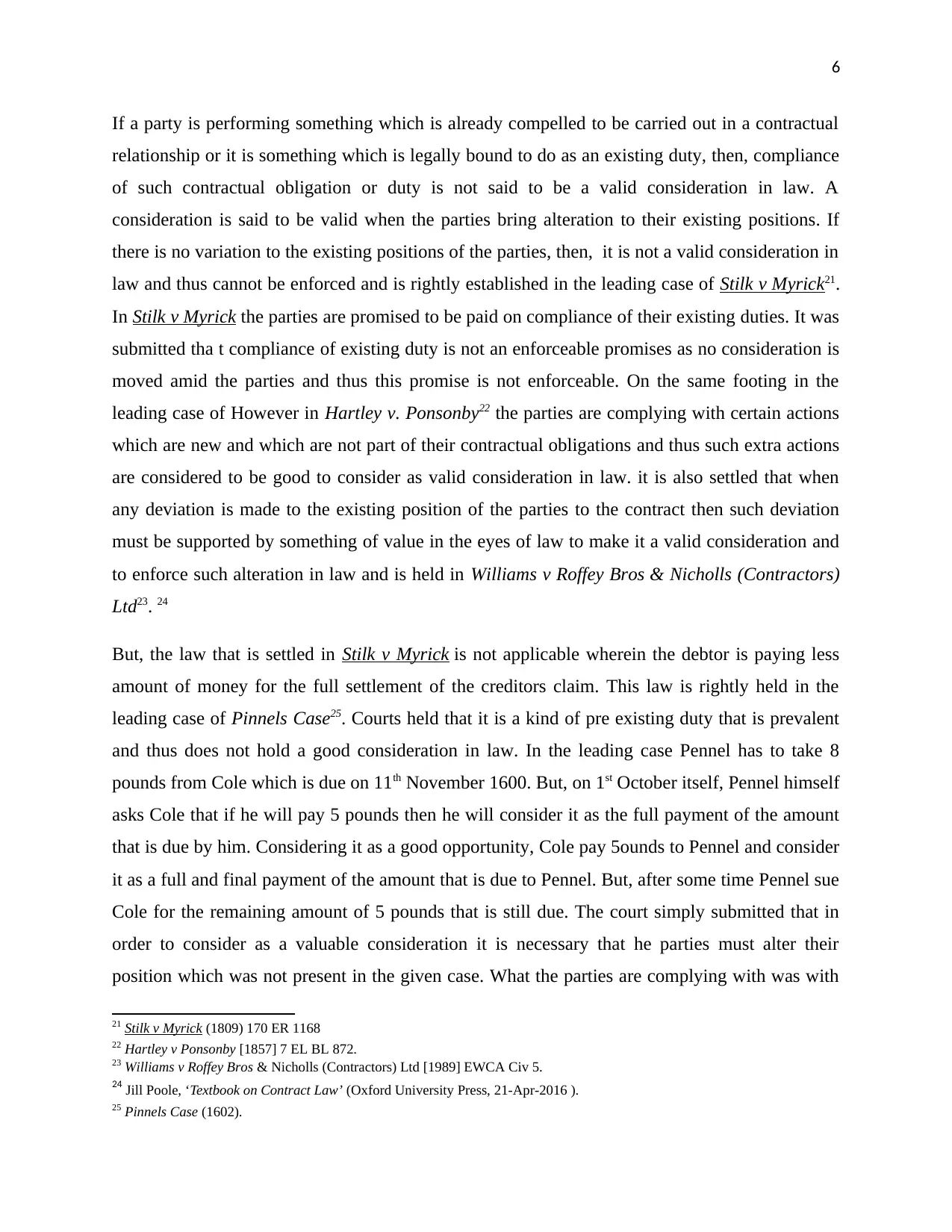
6
If a party is performing something which is already compelled to be carried out in a contractual
relationship or it is something which is legally bound to do as an existing duty, then, compliance
of such contractual obligation or duty is not said to be a valid consideration in law. A
consideration is said to be valid when the parties bring alteration to their existing positions. If
there is no variation to the existing positions of the parties, then, it is not a valid consideration in
law and thus cannot be enforced and is rightly established in the leading case of Stilk v Myrick21.
In Stilk v Myrick the parties are promised to be paid on compliance of their existing duties. It was
submitted tha t compliance of existing duty is not an enforceable promises as no consideration is
moved amid the parties and thus this promise is not enforceable. On the same footing in the
leading case of However in Hartley v. Ponsonby22 the parties are complying with certain actions
which are new and which are not part of their contractual obligations and thus such extra actions
are considered to be good to consider as valid consideration in law. it is also settled that when
any deviation is made to the existing position of the parties to the contract then such deviation
must be supported by something of value in the eyes of law to make it a valid consideration and
to enforce such alteration in law and is held in Williams v Roffey Bros & Nicholls (Contractors)
Ltd23. 24
But, the law that is settled in Stilk v Myrick is not applicable wherein the debtor is paying less
amount of money for the full settlement of the creditors claim. This law is rightly held in the
leading case of Pinnels Case25. Courts held that it is a kind of pre existing duty that is prevalent
and thus does not hold a good consideration in law. In the leading case Pennel has to take 8
pounds from Cole which is due on 11th November 1600. But, on 1st October itself, Pennel himself
asks Cole that if he will pay 5 pounds then he will consider it as the full payment of the amount
that is due by him. Considering it as a good opportunity, Cole pay 5ounds to Pennel and consider
it as a full and final payment of the amount that is due to Pennel. But, after some time Pennel sue
Cole for the remaining amount of 5 pounds that is still due. The court simply submitted that in
order to consider as a valuable consideration it is necessary that he parties must alter their
position which was not present in the given case. What the parties are complying with was with
21 Stilk v Myrick (1809) 170 ER 1168
22 Hartley v Ponsonby [1857] 7 EL BL 872.
23 Williams v Roffey Bros & Nicholls (Contractors) Ltd [1989] EWCA Civ 5.
24 Jill Poole, ‘Textbook on Contract Law’ (Oxford University Press, 21-Apr-2016 ).
25 Pinnels Case (1602).
If a party is performing something which is already compelled to be carried out in a contractual
relationship or it is something which is legally bound to do as an existing duty, then, compliance
of such contractual obligation or duty is not said to be a valid consideration in law. A
consideration is said to be valid when the parties bring alteration to their existing positions. If
there is no variation to the existing positions of the parties, then, it is not a valid consideration in
law and thus cannot be enforced and is rightly established in the leading case of Stilk v Myrick21.
In Stilk v Myrick the parties are promised to be paid on compliance of their existing duties. It was
submitted tha t compliance of existing duty is not an enforceable promises as no consideration is
moved amid the parties and thus this promise is not enforceable. On the same footing in the
leading case of However in Hartley v. Ponsonby22 the parties are complying with certain actions
which are new and which are not part of their contractual obligations and thus such extra actions
are considered to be good to consider as valid consideration in law. it is also settled that when
any deviation is made to the existing position of the parties to the contract then such deviation
must be supported by something of value in the eyes of law to make it a valid consideration and
to enforce such alteration in law and is held in Williams v Roffey Bros & Nicholls (Contractors)
Ltd23. 24
But, the law that is settled in Stilk v Myrick is not applicable wherein the debtor is paying less
amount of money for the full settlement of the creditors claim. This law is rightly held in the
leading case of Pinnels Case25. Courts held that it is a kind of pre existing duty that is prevalent
and thus does not hold a good consideration in law. In the leading case Pennel has to take 8
pounds from Cole which is due on 11th November 1600. But, on 1st October itself, Pennel himself
asks Cole that if he will pay 5 pounds then he will consider it as the full payment of the amount
that is due by him. Considering it as a good opportunity, Cole pay 5ounds to Pennel and consider
it as a full and final payment of the amount that is due to Pennel. But, after some time Pennel sue
Cole for the remaining amount of 5 pounds that is still due. The court simply submitted that in
order to consider as a valuable consideration it is necessary that he parties must alter their
position which was not present in the given case. What the parties are complying with was with
21 Stilk v Myrick (1809) 170 ER 1168
22 Hartley v Ponsonby [1857] 7 EL BL 872.
23 Williams v Roffey Bros & Nicholls (Contractors) Ltd [1989] EWCA Civ 5.
24 Jill Poole, ‘Textbook on Contract Law’ (Oxford University Press, 21-Apr-2016 ).
25 Pinnels Case (1602).
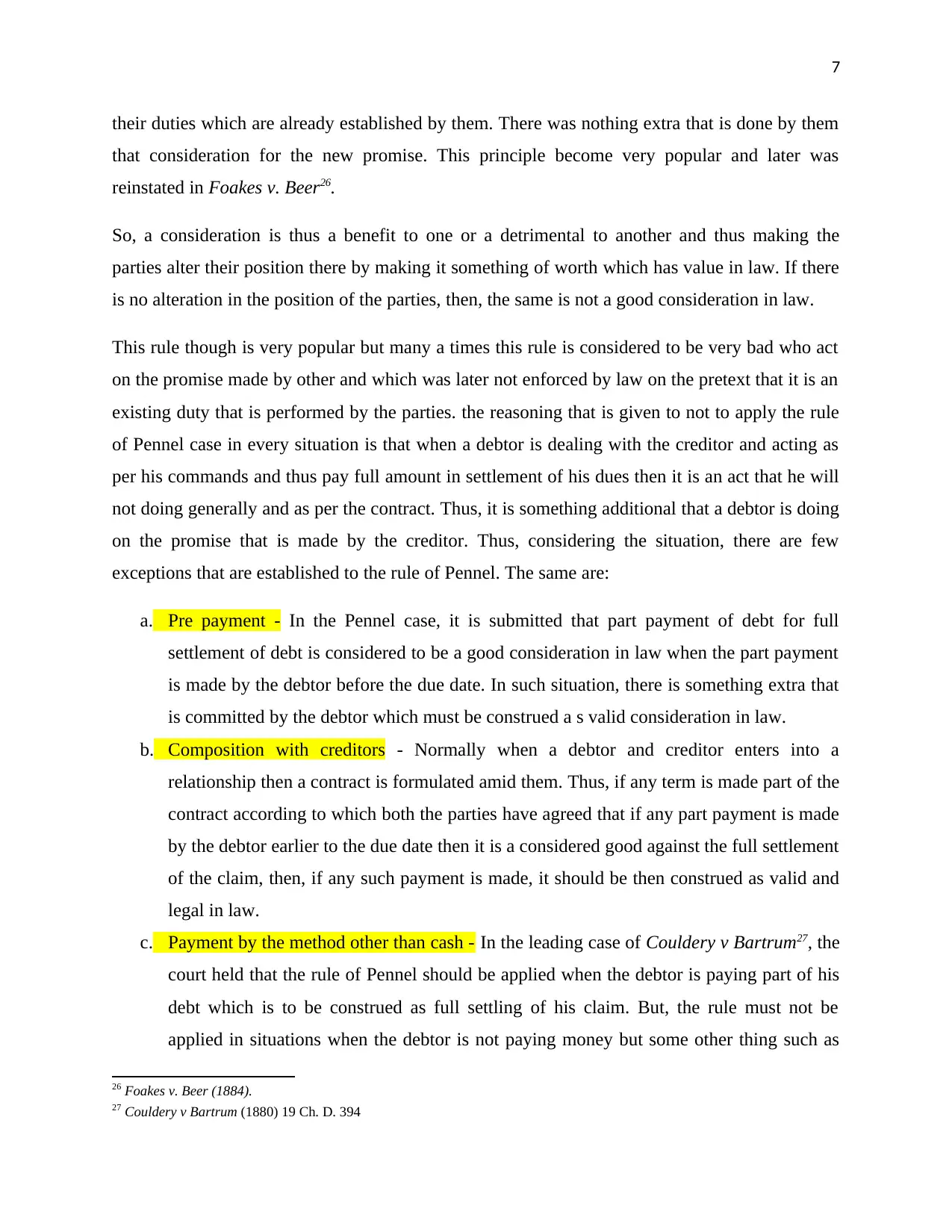
7
their duties which are already established by them. There was nothing extra that is done by them
that consideration for the new promise. This principle become very popular and later was
reinstated in Foakes v. Beer26.
So, a consideration is thus a benefit to one or a detrimental to another and thus making the
parties alter their position there by making it something of worth which has value in law. If there
is no alteration in the position of the parties, then, the same is not a good consideration in law.
This rule though is very popular but many a times this rule is considered to be very bad who act
on the promise made by other and which was later not enforced by law on the pretext that it is an
existing duty that is performed by the parties. the reasoning that is given to not to apply the rule
of Pennel case in every situation is that when a debtor is dealing with the creditor and acting as
per his commands and thus pay full amount in settlement of his dues then it is an act that he will
not doing generally and as per the contract. Thus, it is something additional that a debtor is doing
on the promise that is made by the creditor. Thus, considering the situation, there are few
exceptions that are established to the rule of Pennel. The same are:
a. Pre payment - In the Pennel case, it is submitted that part payment of debt for full
settlement of debt is considered to be a good consideration in law when the part payment
is made by the debtor before the due date. In such situation, there is something extra that
is committed by the debtor which must be construed a s valid consideration in law.
b. Composition with creditors - Normally when a debtor and creditor enters into a
relationship then a contract is formulated amid them. Thus, if any term is made part of the
contract according to which both the parties have agreed that if any part payment is made
by the debtor earlier to the due date then it is a considered good against the full settlement
of the claim, then, if any such payment is made, it should be then construed as valid and
legal in law.
c. Payment by the method other than cash - In the leading case of Couldery v Bartrum27, the
court held that the rule of Pennel should be applied when the debtor is paying part of his
debt which is to be construed as full settling of his claim. But, the rule must not be
applied in situations when the debtor is not paying money but some other thing such as
26 Foakes v. Beer (1884).
27 Couldery v Bartrum (1880) 19 Ch. D. 394
their duties which are already established by them. There was nothing extra that is done by them
that consideration for the new promise. This principle become very popular and later was
reinstated in Foakes v. Beer26.
So, a consideration is thus a benefit to one or a detrimental to another and thus making the
parties alter their position there by making it something of worth which has value in law. If there
is no alteration in the position of the parties, then, the same is not a good consideration in law.
This rule though is very popular but many a times this rule is considered to be very bad who act
on the promise made by other and which was later not enforced by law on the pretext that it is an
existing duty that is performed by the parties. the reasoning that is given to not to apply the rule
of Pennel case in every situation is that when a debtor is dealing with the creditor and acting as
per his commands and thus pay full amount in settlement of his dues then it is an act that he will
not doing generally and as per the contract. Thus, it is something additional that a debtor is doing
on the promise that is made by the creditor. Thus, considering the situation, there are few
exceptions that are established to the rule of Pennel. The same are:
a. Pre payment - In the Pennel case, it is submitted that part payment of debt for full
settlement of debt is considered to be a good consideration in law when the part payment
is made by the debtor before the due date. In such situation, there is something extra that
is committed by the debtor which must be construed a s valid consideration in law.
b. Composition with creditors - Normally when a debtor and creditor enters into a
relationship then a contract is formulated amid them. Thus, if any term is made part of the
contract according to which both the parties have agreed that if any part payment is made
by the debtor earlier to the due date then it is a considered good against the full settlement
of the claim, then, if any such payment is made, it should be then construed as valid and
legal in law.
c. Payment by the method other than cash - In the leading case of Couldery v Bartrum27, the
court held that the rule of Pennel should be applied when the debtor is paying part of his
debt which is to be construed as full settling of his claim. But, the rule must not be
applied in situations when the debtor is not paying money but some other thing such as
26 Foakes v. Beer (1884).
27 Couldery v Bartrum (1880) 19 Ch. D. 394
Paraphrase This Document
Need a fresh take? Get an instant paraphrase of this document with our AI Paraphraser
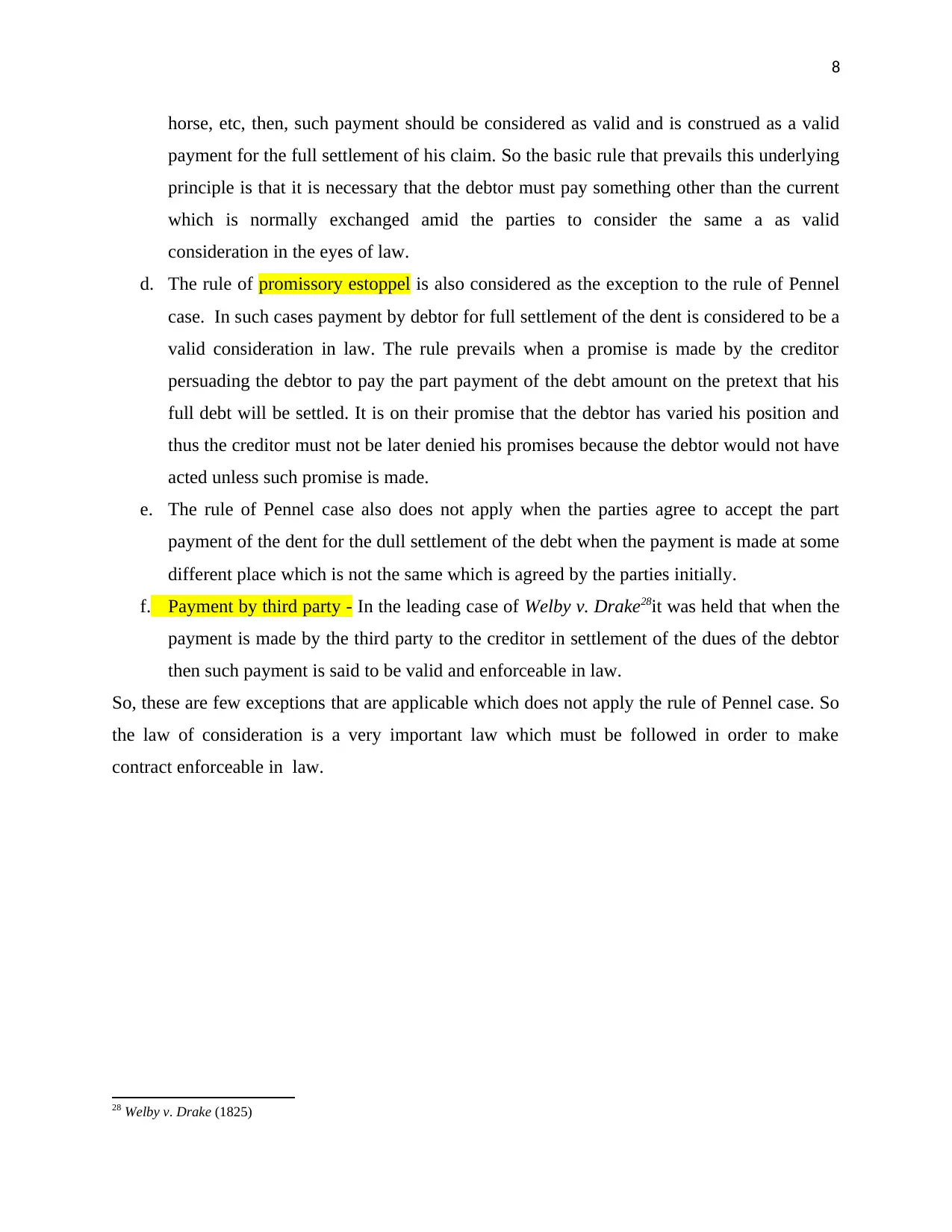
8
horse, etc, then, such payment should be considered as valid and is construed as a valid
payment for the full settlement of his claim. So the basic rule that prevails this underlying
principle is that it is necessary that the debtor must pay something other than the current
which is normally exchanged amid the parties to consider the same a as valid
consideration in the eyes of law.
d. The rule of promissory estoppel is also considered as the exception to the rule of Pennel
case. In such cases payment by debtor for full settlement of the dent is considered to be a
valid consideration in law. The rule prevails when a promise is made by the creditor
persuading the debtor to pay the part payment of the debt amount on the pretext that his
full debt will be settled. It is on their promise that the debtor has varied his position and
thus the creditor must not be later denied his promises because the debtor would not have
acted unless such promise is made.
e. The rule of Pennel case also does not apply when the parties agree to accept the part
payment of the dent for the dull settlement of the debt when the payment is made at some
different place which is not the same which is agreed by the parties initially.
f. Payment by third party - In the leading case of Welby v. Drake28it was held that when the
payment is made by the third party to the creditor in settlement of the dues of the debtor
then such payment is said to be valid and enforceable in law.
So, these are few exceptions that are applicable which does not apply the rule of Pennel case. So
the law of consideration is a very important law which must be followed in order to make
contract enforceable in law.
28 Welby v. Drake (1825)
horse, etc, then, such payment should be considered as valid and is construed as a valid
payment for the full settlement of his claim. So the basic rule that prevails this underlying
principle is that it is necessary that the debtor must pay something other than the current
which is normally exchanged amid the parties to consider the same a as valid
consideration in the eyes of law.
d. The rule of promissory estoppel is also considered as the exception to the rule of Pennel
case. In such cases payment by debtor for full settlement of the dent is considered to be a
valid consideration in law. The rule prevails when a promise is made by the creditor
persuading the debtor to pay the part payment of the debt amount on the pretext that his
full debt will be settled. It is on their promise that the debtor has varied his position and
thus the creditor must not be later denied his promises because the debtor would not have
acted unless such promise is made.
e. The rule of Pennel case also does not apply when the parties agree to accept the part
payment of the dent for the dull settlement of the debt when the payment is made at some
different place which is not the same which is agreed by the parties initially.
f. Payment by third party - In the leading case of Welby v. Drake28it was held that when the
payment is made by the third party to the creditor in settlement of the dues of the debtor
then such payment is said to be valid and enforceable in law.
So, these are few exceptions that are applicable which does not apply the rule of Pennel case. So
the law of consideration is a very important law which must be followed in order to make
contract enforceable in law.
28 Welby v. Drake (1825)
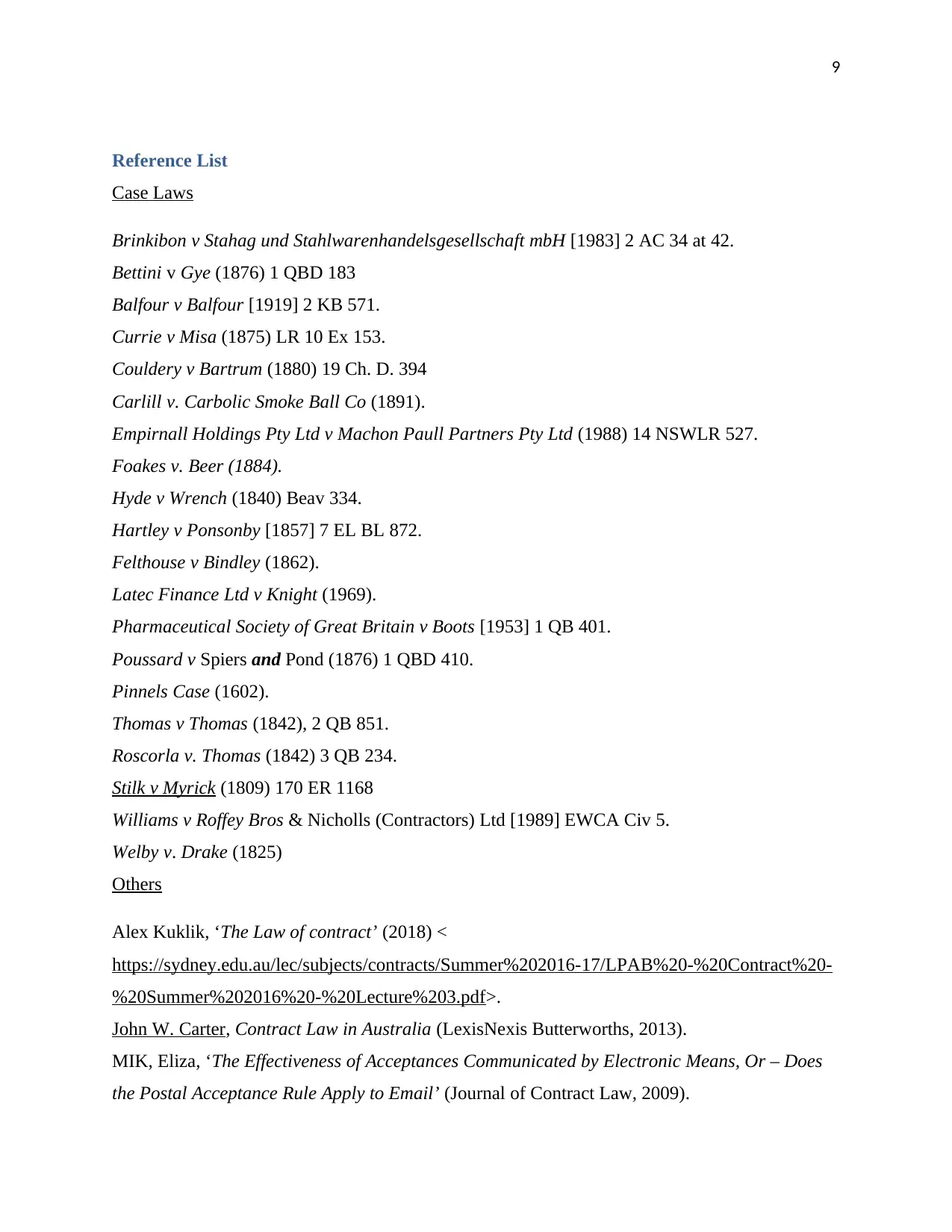
9
Reference List
Case Laws
Brinkibon v Stahag und Stahlwarenhandelsgesellschaft mbH [1983] 2 AC 34 at 42.
Bettini v Gye (1876) 1 QBD 183
Balfour v Balfour [1919] 2 KB 571.
Currie v Misa (1875) LR 10 Ex 153.
Couldery v Bartrum (1880) 19 Ch. D. 394
Carlill v. Carbolic Smoke Ball Co (1891).
Empirnall Holdings Pty Ltd v Machon Paull Partners Pty Ltd (1988) 14 NSWLR 527.
Foakes v. Beer (1884).
Hyde v Wrench (1840) Beav 334.
Hartley v Ponsonby [1857] 7 EL BL 872.
Felthouse v Bindley (1862).
Latec Finance Ltd v Knight (1969).
Pharmaceutical Society of Great Britain v Boots [1953] 1 QB 401.
Poussard v Spiers and Pond (1876) 1 QBD 410.
Pinnels Case (1602).
Thomas v Thomas (1842), 2 QB 851.
Roscorla v. Thomas (1842) 3 QB 234.
Stilk v Myrick (1809) 170 ER 1168
Williams v Roffey Bros & Nicholls (Contractors) Ltd [1989] EWCA Civ 5.
Welby v. Drake (1825)
Others
Alex Kuklik, ‘The Law of contract’ (2018) <
https://sydney.edu.au/lec/subjects/contracts/Summer%202016-17/LPAB%20-%20Contract%20-
%20Summer%202016%20-%20Lecture%203.pdf>.
John W. Carter, Contract Law in Australia (LexisNexis Butterworths, 2013).
MIK, Eliza, ‘The Effectiveness of Acceptances Communicated by Electronic Means, Or – Does
the Postal Acceptance Rule Apply to Email’ (Journal of Contract Law, 2009).
Reference List
Case Laws
Brinkibon v Stahag und Stahlwarenhandelsgesellschaft mbH [1983] 2 AC 34 at 42.
Bettini v Gye (1876) 1 QBD 183
Balfour v Balfour [1919] 2 KB 571.
Currie v Misa (1875) LR 10 Ex 153.
Couldery v Bartrum (1880) 19 Ch. D. 394
Carlill v. Carbolic Smoke Ball Co (1891).
Empirnall Holdings Pty Ltd v Machon Paull Partners Pty Ltd (1988) 14 NSWLR 527.
Foakes v. Beer (1884).
Hyde v Wrench (1840) Beav 334.
Hartley v Ponsonby [1857] 7 EL BL 872.
Felthouse v Bindley (1862).
Latec Finance Ltd v Knight (1969).
Pharmaceutical Society of Great Britain v Boots [1953] 1 QB 401.
Poussard v Spiers and Pond (1876) 1 QBD 410.
Pinnels Case (1602).
Thomas v Thomas (1842), 2 QB 851.
Roscorla v. Thomas (1842) 3 QB 234.
Stilk v Myrick (1809) 170 ER 1168
Williams v Roffey Bros & Nicholls (Contractors) Ltd [1989] EWCA Civ 5.
Welby v. Drake (1825)
Others
Alex Kuklik, ‘The Law of contract’ (2018) <
https://sydney.edu.au/lec/subjects/contracts/Summer%202016-17/LPAB%20-%20Contract%20-
%20Summer%202016%20-%20Lecture%203.pdf>.
John W. Carter, Contract Law in Australia (LexisNexis Butterworths, 2013).
MIK, Eliza, ‘The Effectiveness of Acceptances Communicated by Electronic Means, Or – Does
the Postal Acceptance Rule Apply to Email’ (Journal of Contract Law, 2009).

10
Jill Poole, ‘Textbook on Contract Law’ (Oxford University Press, 21-Apr-2016 ).
Peter Gillies, ‘Business Law’ (Federation Press, 2004).
Jill Poole, ‘Textbook on Contract Law’ (Oxford University Press, 21-Apr-2016 ).
Peter Gillies, ‘Business Law’ (Federation Press, 2004).
1 out of 10
Related Documents
Your All-in-One AI-Powered Toolkit for Academic Success.
+13062052269
info@desklib.com
Available 24*7 on WhatsApp / Email
![[object Object]](/_next/static/media/star-bottom.7253800d.svg)
Unlock your academic potential
© 2024 | Zucol Services PVT LTD | All rights reserved.




